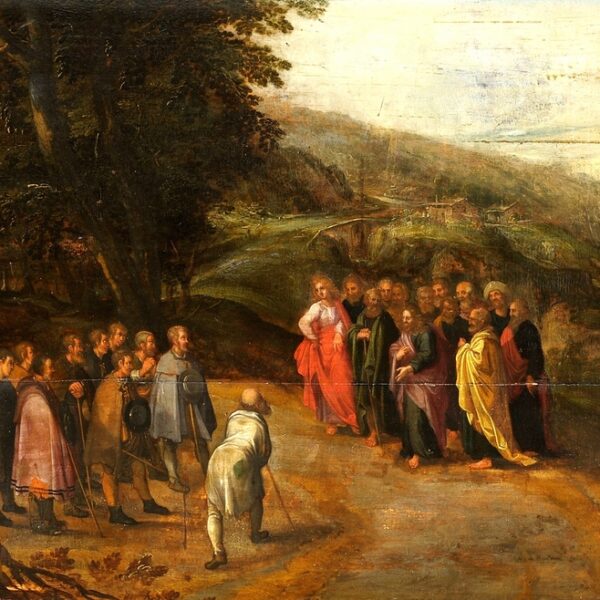Preach the gospel. . .and use words

The Gift of Faith
August 25, 2013
That’s My King!
August 29, 2013There is a popular saying, “Preach the gospel at all times; when necessary, use words.” This motto is often attributed to St. Francis of Assisi, but that is widely disputed. I personally became acquainted with this saying when I read Amy Hollingsworth’s The Simple Faith of Mister Rogers, as she described Fred Rogers with this principle.
Wherever this proverb originated, it is not found in scripture. Its implications are that we are to present the gospel primarily in deeds (although what those deeds consist of is not specified), and that words are to be used as a last resort. This is contrary to what scripture teaches.
In Acts 4, we see Peter and John getting in trouble with the captain of the temple guard and the Sadducees, nabbed and thrown into jail. Why? Verse 2 explains, “They were greatly disturbed because the apostles were teaching the people, proclaiming in Jesus the resurrection of the dead.” After Peter and John arouse the anger of these authorities, scripture says “But many who heard the message believed; so the number of men who believed grew to about five thousand” (v. 4).
How would you like to go out with a friend from church, preach on the nearest city corner, and get five thousand new believers? I remember how elated I was to see three once after a day’s work!
The entire city of Jerusalem is turned on its head by Peter and John, and the authorities discuss this in dismay. They realize that there’s nothing they can do to undo the healing of the lame man which preceded this mighty tide of evangelism (Acts 3:1-10). So, “they called them in again and commanded them not to speak or teach at all in the name of Jesus. But Peter and John replied, “Which is right in God’s eyes: to listen to you, or to Him? You be the judges! As for us, we cannot help speaking about what we have seen and heard.”
The Sanhedrin in Acts 4:18 tried to shut Peter and John down NOT by commanding them no longer to heal or do good deeds, but by ordering them “not to speak or teach at all in the name of Jesus.” This was the threat – the name of Jesus!
Later, in chapter five, the apostles again have a run-in with the Sanhedrin – this time, the officials are so enraged that the men have been teaching and preaching that they’re ready to kill the disciples. A Pharisee by the name of Gamaliel intervenes with a voice of reason, and the Sanhedrin has to be satisfied with giving the disciples a flogging instead, before releasing them. Again, the disciples are warned by the religious authorities not to speak the name of Jesus. Yet the disciples pay no attention to this whatsoever, and leave “rejoicing that they were counted worthy to suffer disgrace for the sake of the Name. Day after day, in the temple courts and from house to house, they never stopped teaching and proclaiming the good news that Jesus is the Messiah” (v. 42).
What was the central threat to the kingdom of darkness, manifested in the Sanhedrin and other Jewish leaders? Preaching and teaching the Name of Jesus. And what deed preceded the tremendous storm of faith that besieged the citizens of Jerusalem and made them give their hearts to Christ? It was not the building of a house as a missions project by Peter and John, nor was it their service in a soup kitchen. It was the instant and miraculous healing of a man who’d been lame from birth, forty years. What opened the door for the gospel to reach thousands was a deed that no one humanly could do.
In Revelation 12:11 the saints overcome Satan by “the blood of the Lamb and the word of their testimony” and they did not love their lives unto death. There are three components of overcoming Satan listed here. He is not overcome with political activism, with social justice, nor with a particular denomination’s best strategies. Rather it is the blood of Christ and the testimony of those who bear witness to Christ – to the point that they are willing to be martyred for it – that overthrows Satan and his legions.
The gospel that Jesus preached came both in word and deed. Preaching, teaching, healing, and delivering people from demons was how Jesus spent His time on earth. This is how the apostles ministered, and this is how we are to minister today. When we do not speak the word, there is no threat to the kingdom of hell. Therefore in a culture that seeks to intimidate Christians from speaking the gospel by uninformed and meaningless cliches such as “separation of church and state” and even this wise-sounding quote tied to St. Francis of Assisi, it becomes increasingly necessary that we know what the Bible says about what we’re to do: that we’re to preach and teach the name of Jesus without ceasing, without fear of threats. Words are necessary – the name of Jesus Christ sets people free.






2 Comments
This has so encouraged me and confirms the power of the Word of God and the nave of Jesus!! Amen and Amen!!
Joe, I’m so humbled that God spoke to you. Amen, I agree – there is great power in the word and in the name of Jesus!